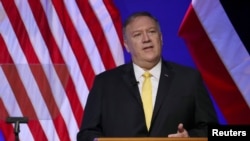In a speech Friday to a regional youth leadership program in Thailand, Secretary of State Mike Pompeo defended new U.S. tariffs on China, saying, "We want free and fair trade, not trade that undermines competition."
Pompeo's statements came after U.S. President Donald Trump announced he would impose a 10 percent tariff on the remaining $300 billion in Chinese imports starting September first.
Pompeo chided China for "decades of bad behavior" that have stalled free trade. "It's time for that to stop," he said.
He also mentioned the massive anti-government protests in Hong Kong. "We also believe in human rights and freedom," he said. "The current unrest in Hong Kong clearly shows that the will and the voice of the governed will always be heard."
Pompeo, who has assured his Southeast Asian partners this week that they do not have to choose between the U.S. and China, used his speech Friday to contrast U.S. and Chinese investment.
He described Chinese investment as exploitative, and U.S. investment as mutually beneficial.
He said, "Ask yourself this: Who really encourages self-sufficiency and not dependence, investors who are working to meet your consumers' needs, or those who entrap you in debt?"
Pompeo stayed on message about the main priorities of his visit.
New tariffs
Separately, Pompeo's Chinese counterpart, Wang Yi, told reporters in Bangkok that the new U.S. tariffs are not a correct or constructive way to resolve the trade dispute between the two countries.
But Pompeo told the young leaders the Trump administration "is invested in the sovereignty, in the resilience and the prosperity of each southeast Asian nation."
Asked about the failure of North Korea's foreign minister to come to Bangkok to meet with Pompeo or others, a senior U.S. administration official said, "There is ongoing communication with the North Koreans on a regular basis. While we would like to be further along in restarting working-level negotiations, we are in regular contact with the North Koreans."
As Pompeo met with top ASEAN diplomats Friday, at least four people were injured in six bomb blasts across Bangkok. Reporters traveling with the secretary said they did not hear the explosions from their location.
"We're aware of reports of several small explosions in Thailand," the State Department told VOA. "We refer you to local authorities for additional information. There was no impact on Secretary Pompeo's visit."
Thailand's prime minister, Prayuth Chan-ocha, has ordered an investigation into the blasts, viewed as damaging to the country's reputation during the high-profile event.
The bombings come just two weeks after the prime minister's former military junta transformed into a civilian government.
On Saturday, Pompeo will travel from Thailand to Australia. Along with Secretary of Defense Mark Esper, he will lead the U.S. delegation to the Australia-United States Ministerial Consultations (AUSMIN). The secretary will also meet with Australian Prime Minister Scott Morrison.
On Monday, Pompeo will depart for the last planned leg of this trip, the Federated States of Micronesia, to reaffirm the U.S. partnership with the Pacific Island country — the first-ever visit to Micronesia by a U.S. secretary of state.




